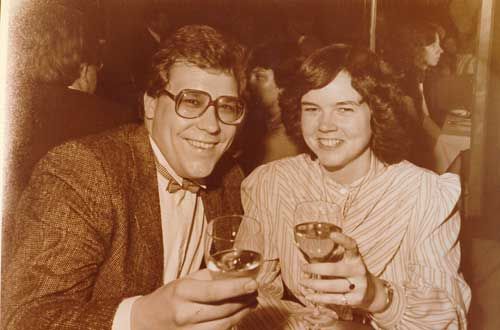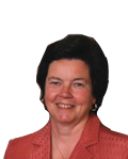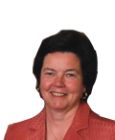Hormones
The Prom Date
Four decades earlier, we'd danced the night away to Abba - but what were we now?
Updated July 30, 2024

“What’s your relationship to the patient?” the nurse asked gently. I wondered how many times she’d asked that question over the last few days, and how much easier it had been for the others to answer it. Sister. Son. Ex-wife. Current boyfriend. But now me.
“Prom date”? I ventured. I don’t know why that’s what came to mind, especially given the complicated cast of characters already in the room. It had been true, 40 years earlier, but right now it was hardly the best description of who Danny was.
We’d met at 15, at a community theater group, where I could usually be found hammering flats together while Danny was hamming it up on stage. He held my hand, kissed me behind the set, and before you knew it we were a couple (or as much of a couple as you can be at that age). He taught me the Hustle, and we danced to Abba and Donna Summer and the Silver Convention. We discoed our way through two senior proms, mine and his, and although we parted ways for college we always picked up again right where we left off when he came home on breaks.
Danny was charming and romantic, flamboyant and extravagant, and I loved him (almost) completely, but I always knew there was some indefinable something missing. Eventually he realized it, too, and we evolved from being a couple to being friends. We never actually broke up, we just sort of shape-shifted. When I flew 3,000 miles to be at his wedding, I didn’t doubt for a minute that he’d made the right choice.
His new wife was perfect for him, and nothing seemed to be missing between them. She shared, or at least indulged, his flair for the over-the-top – the black-tie events and elaborate theme parties, the exotic vacations, and now let’s move to Europe! She kept pace with him in a way I knew I’d find exhausting.
I had grown up in such a limited world, where roles were prescribed and you did what you were told. We were ordinary people. But Danny… Danny made the extraordinary seem possible. I had never even been on a vacation, let alone an airplane, but my first flight was to Los Angeles to visit him at college. In my family, young girls did not fly off to Paris with their boyfriends, but I got my first passport so I could see it with him. So many of the baby steps I took outside of my narrow world, so many of the possibilities that I eventually saw for myself, I owed to him.
When I was 30, and beginning to understand that what had been missing from our young love had been me, his was one of the more difficult coming-out letters I wrote. How do you tell your prom date you’re gay? (At least it helped explain why I’d been building sets while he was chewing scenery.) I found out later it was his wife who told him to call me immediately after getting my letter. It was a liberating call — after all those years I finally had a life that was extraordinary on its own terms, and I still had Danny to share it with.
From that point on we shared confidences and commiserations on a newly honest footing. We talked about careers, kids, relationships, illness, everything. As the kids got older and our lives got crazier we didn’t talk as often as we once had, but it always made my day when my phone belted out those opening notes to “Dancing Queen” — and when I called him I knew his phone played that same ring tone, calling us both back to prom night 1976.
He was relentlessly positive, even the day he called to say he’d been diagnosed with prostate cancer. It was early, he said, Stage I, he could beat it. When surgery revealed that it wasn’t Stage I but Stage IV, he poured his energies into helping other patients get through it. He blogged, he fund-raised, he was a machine. The hormone therapy was tough, but he managed to find humor in its feminizing influences (“OMG, I cried at work today!” he texted). And then he was through it, he was cured, and life could go back to normal. If only.
One day I got a brief text – check your email, he said, then call me. It was a long message, but my eyes danced over it quickly to get the gist. I texted back – give me 5 to process, okay? – before I read and re-read it. His health was fine (I could exhale), but the whole cancer experience and hormones and recovery had made him question so many things. He had finished treatment, yes, but he was not yet considered a survivor. He was between jobs, so he had no career identity. Who was he? What was he?
What he was, he’d concluded, was gay. He told me about feelings and temptations that went back to, well, the Temptations. I knew what it was like growing up in the 1960s and 1970s – homosexuals are bad, I am good, therefore I am not a homosexual. But as the world started changing, and it became less unthinkable for me to be gay, Danny was already a husband and father. At 30 I’d been free to come out, but by then he’d made his choices and it was too late for him – or so he’d thought. Now he was past 50, but it could no longer be contained.
Two decades earlier I’d found it awkward to tell him I was gay; I couldn’t imagine what it was like for him to tell his wife and their teenage sons. Danny was genuinely bewildered that they weren’t delighted for him – he felt so free, so authentic, so liberated, how could they not share his joy? They did not. They were devastated, confused, betrayed – and so angry with him for breaking up their family, for upending their lives for the sake of his selfish desires.
He turned to me as the one friend who would surely be happy for him, would revel with him in his newfound truth. I was, and I did, of course. But… the wife who’d hosted the theme parties with him and moved to Europe for him, who had nursed him through his cancer, the one who’d read my coming-out letter to him and told him to pick up the phone… what about her? What if my own wife had suddenly come to the realization that she was straight? Would I be rejoicing in her self-actualization as she walked out the door on me and our children?
I had been single when I came out, and although I surprised a few people (maybe not as many as I’d expected), I didn’t hurt anyone. Danny raised a few eyebrows, but he also caused so much pain. It was hard not to ache for his family as they stumbled through it.
But he was so, so happy. His life was a mess, he was flat broke, and as he navigated through the divorce it must have felt as if all the world were against him. But he was, finally, himself. He embraced his new life as only he could – the parties may have had a new theme, but they were always pure Danny, always over-the-top fun. Every phone call, every visit, was accented with his infectious laughter.
The text that said his cancer was back was brief, and he didn’t pick up when I immediately dialed his number. He let “Dancing Queen” play unanswered, and then texted back to say he couldn’t talk to me. “I’d only cry right now,” he wrote. I’d never heard him so defeated.
We talked a bit later, when he’d gotten some of his mojo back. He had time, he said, and didn’t have to decide right away how to proceed. He knew he didn’t want the hormones again, was undecided about other treatments. Maybe just a little chemo, smoke a few joints? The cancer wasn’t in his bones yet, which he said bought him at least five years. I finally understood what “Stage IV” should have told me several years earlier. This was how Danny would die – not right now, maybe, but not in 30 years, either. He wouldn’t grow old, wouldn’t see his sons marry, wouldn’t know his grandchildren. But if I knew Danny, whatever years he had left would be great.
And they were – he started a new career, found a new love, created a new home. He learned to play the saxophone, and he wrote a book. He worked on reconciling with his sons, and he never stopped trying to be a good father to them. He didn’t waste a minute.
Then one day from out of the blue his heart stopped, and his brain died, and just like that it was all over. I’d flown 3,000 miles to hold his hand one last time before the tubes came out. I discovered only then that his choice of cancer treatment had been “none of the above” – he had decided to forgo everything and live his life to the fullest. It was pure Danny, and life had been kind enough to spare him a protracted final decline. The tragicomic group at his bedside was even providing a drama I’m sure he would have appreciated.
And now a nurse was asking me what my relationship was to the patient. I knew my grief couldn’t hold a candle to that of the others in the room. His sisters were brokenhearted, his boyfriend shell-shocked. His ex-wife and sons were losing him for a second time. But my loss was extraordinary, and it was uniquely mine.
“Prom date,” I said again. “He was my prom date.”




